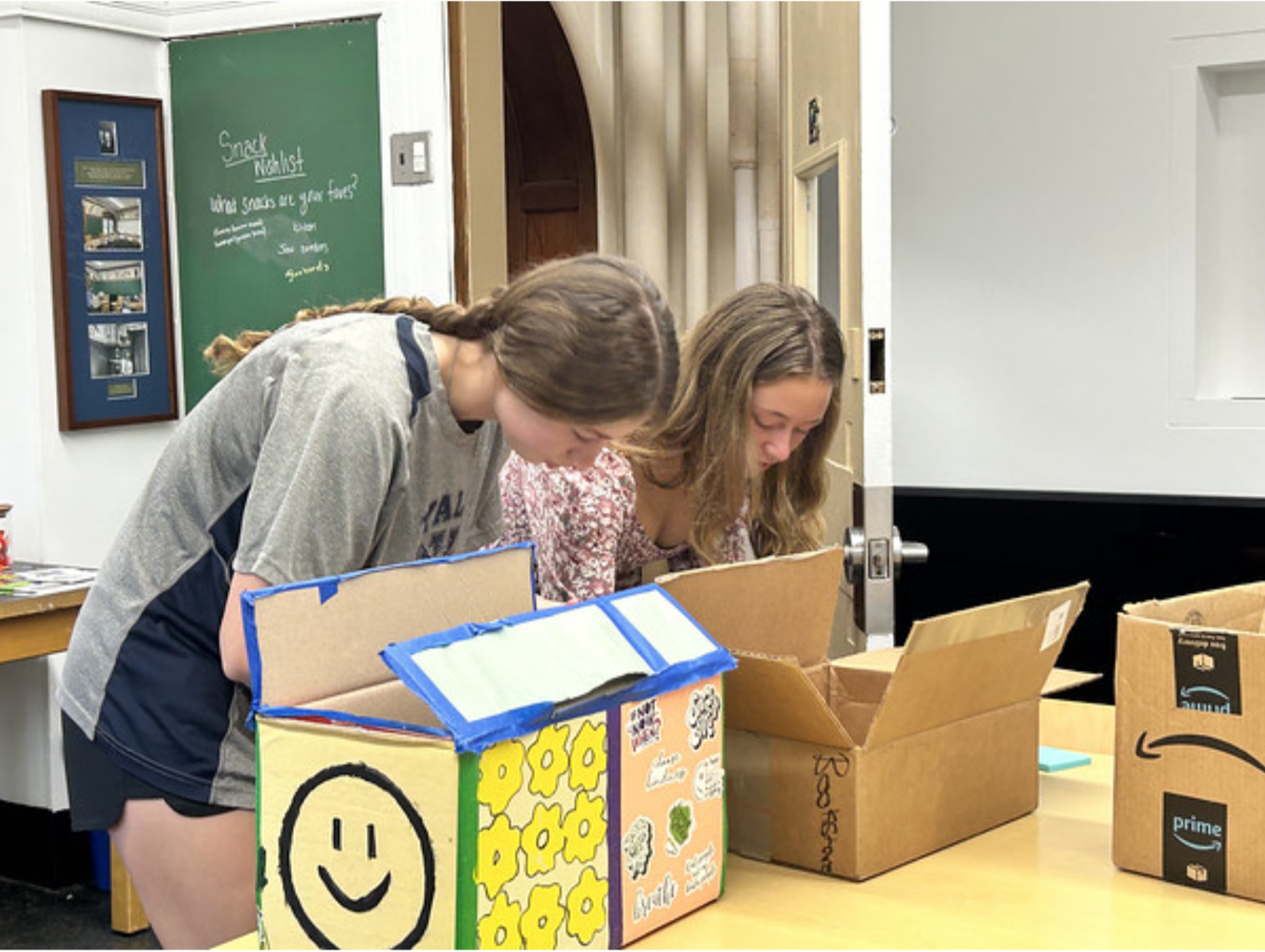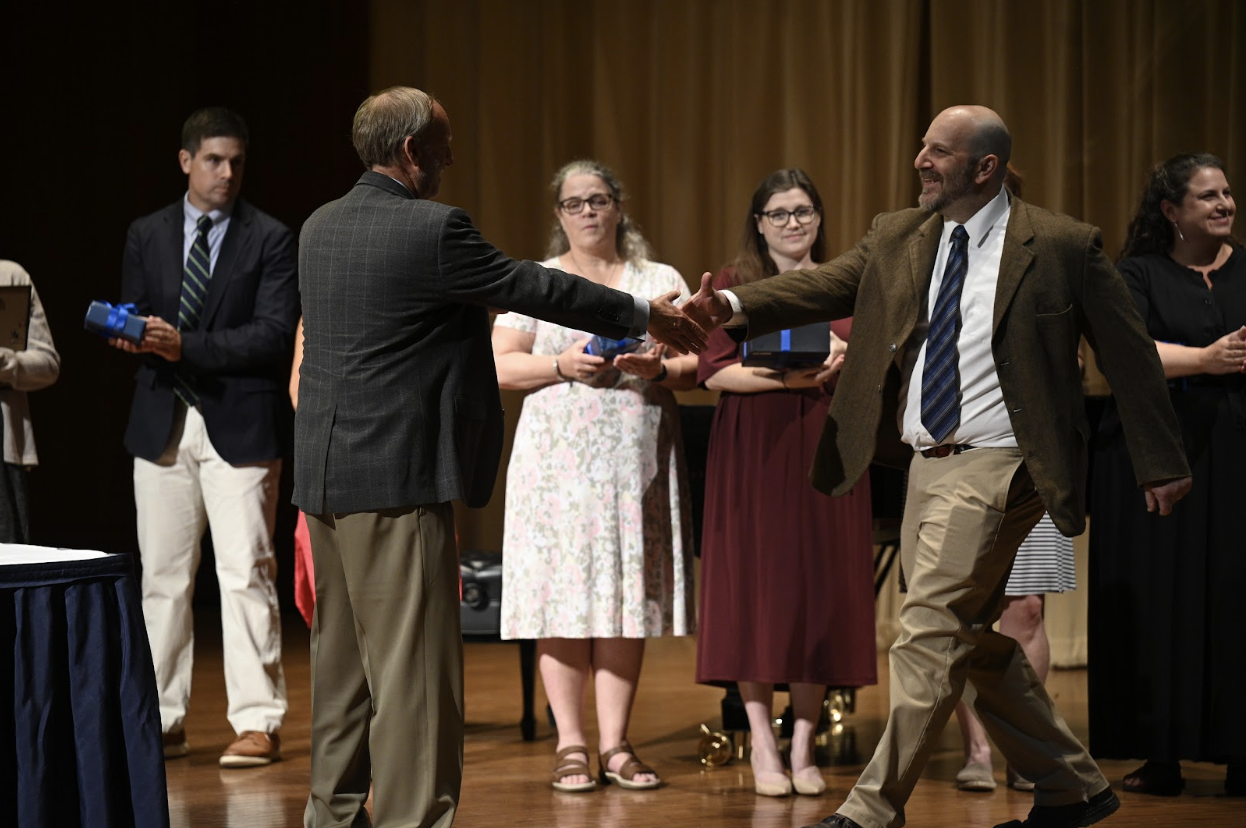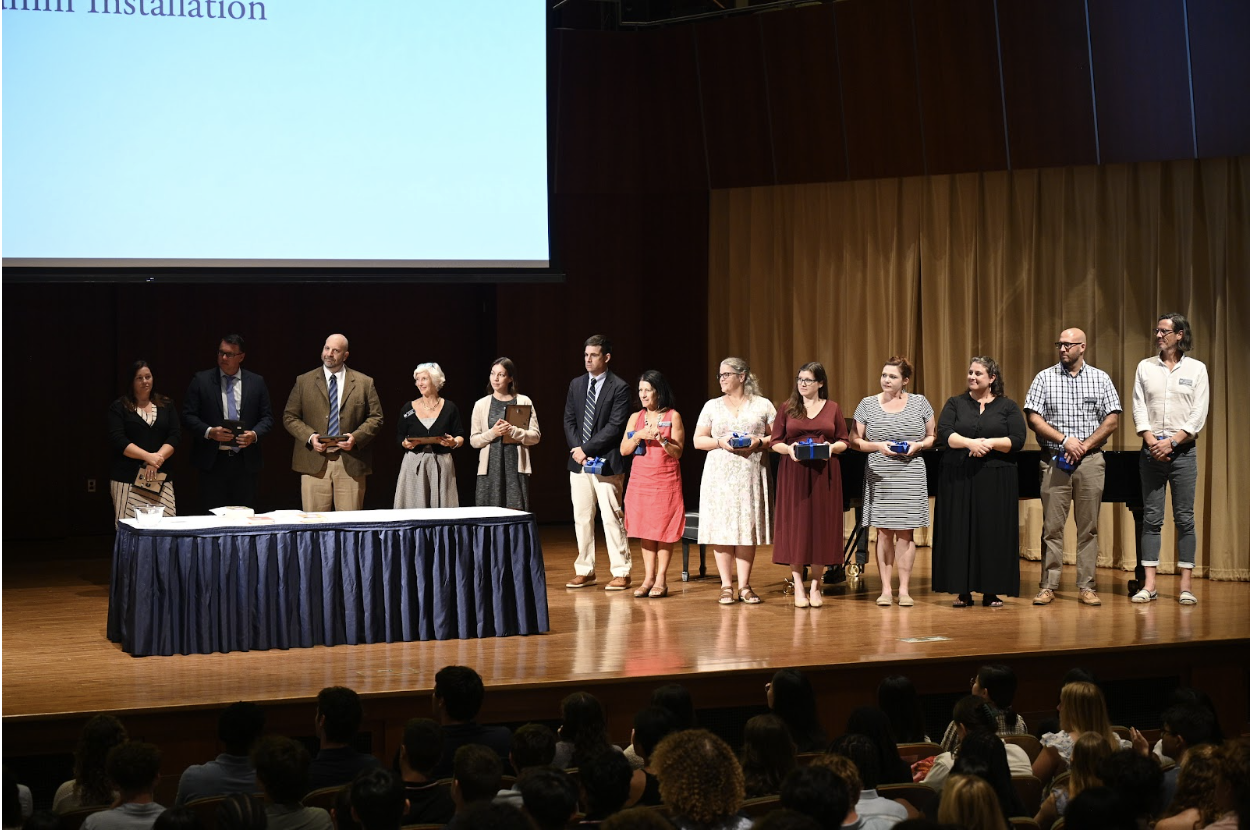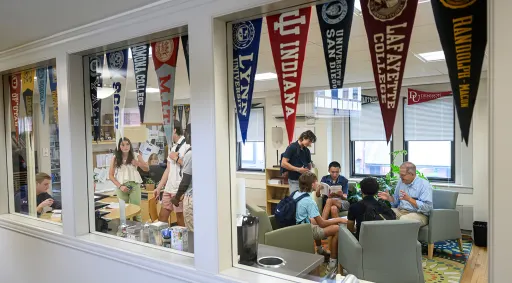Vanessa Leung ‘25
On October 19, St. Mark’s welcomed Dino Ambrosi, the first Gray Colloquium speaker of the 2023-2024 school year. Dino Ambrosi is a digital wellness speaker and the founder of Project Reboot. He aims to help his peers and teenagers reduce their screen time and develop healthier relationships with technology.
Dino Ambrosi presented a well-structured presentation. He first integrated his speech with this year’s Gray Colloquium theme, AI and Citizenship, where he briefly mentioned the evolution of social media: from a wholesome platform that connects family and friends far away from each other, to a complex, market-driven digital landscape that shapes discourse and influences.
Mr. Ambrosi explains that because of this shift, the main goal of social media is to maximize profit through targeted advertising, an area that artificial intelligence monitors and becomes advanced at, which also causes the side effect of echo chambers or filtered bubbles that reinforce existing user beliefs by limiting exposure to diverse perspectives.
With this in mind, he connects this to the main topic of his talk: technology addiction. With AI’s algorithm that generates content-based filtering, this draws users into the vortex of social media. Another reason for the addiction to social media is because it produces instant gratification: “Like cigarettes, for instance. You can light up and get a nicotine hit. It's a coping mechanism that people have,” Mr. Ambrosi said earlier in his interview. “But you can't light up a cigarette in the library. You'll get kicked out. [But] nobody's going to bat an eye if you scroll through TikTok or Instagram. It's something that unless you're highly intentional about it and you take some steps to ensure that it's easy to remain intentional in how you use your phone, you're almost guaranteed to have it become your coping mechanism for discomfort.”
Mr. Ambrosi leaves the audience with a caveat about social media: “There is no such thing as free content.” Mr. Ambrosi elaborates more in his interview: “Social media is free in the sense that it doesn't charge you money but you're paying a price always. Nothing is free online. You need to think critically as a consumer on the internet about whether or not you're comfortable allowing an algorithm to drive your attention. Deeply recognize that you pay for social media with your time and strive to get a good deal out of it.”
Before Dino Ambrosi’s Gray Colloquium speech, I had the privilege of interviewing him in-person, where I was allowed to ask more questions about Mr. Ambrosi’s past and experience with technology.
Tell me about your experience, what inspired you to do what you do today?
“It all started with me becoming addicted to my phone in college. Which at the time, I didn't even know that was a thing that could happen…it wasn't something that was talked about very much…I was a freshman at Berkeley in 2017. And there had been… some warnings and some concern from adults in my life about screen time and social media back when I was in high school. But I really thought that was overblown because it wasn't a problem for me. In high school, I was a pretty overachieving student. I had a lot of extracurriculars. You know, I was a go-getter. And I just didn't have the time in my schedule to…waste a bunch of time on screens. So I really thought like, these are tools that enhance my life. The concern about them is overblown.
But then I went to college. And it was just so much more difficult than the schools that I went to in high school. And you lose all that structure in your schedule. So nobody is holding your hand. Especially at a school like Berkeley. Like you've got all these blocks of free time that you need to figure out how to fill up. And if you don't have time management skills, that's really difficult to do.
So long story short, I fell behind in school. And it was just the first time in my life that I was really stressed out and anxious and overwhelmed and feeling imposter syndrome for sure. And that was a really good opportunity for me to grow a lot. But I didn't face those challenges head on. Because I honestly and consciously just developed the habit of running away from that discomfort by turning to my phone. And that habit really derailed my college experience. And I just didn't get nearly as much out of my time at Berkeley as I could have. Because I was glued to my phone. And I wasted so much time. It definitely impacted my academic performance. And I look back on those first few years of college with a lot of regret. And it wasn't until I was given the chance to take a break from school and go do an internship. That I really hit the reset button and got off social media for a while. And paid a lot of attention to how I use technology. And I just saw so many benefits in my own life from changing the way I use my phone and my computer. Both in terms of eliminating unintentional abuse. But then also learning how to leverage it to manage my time more effectively. And learn things on the internet. There are all sorts of positive aspects of technology and social media. And improving my relationship with it just changed my life. So that kind of put me on this path of trying to figure out what is the ideal relationship with technology.”
I myself have a phone addiction and am fully aware of it, but sometimes temptation overcomes me. How did you deal with your addiction?
I mean, here's what's ironic about it. When I realized that this was a problem, it made the problem worse… because becoming aware of the fact that you're addicted to something and that it's impacting your mental health, your attention span, your performance in school, and how you're spending your free time, that's a profoundly uncomfortable realization to have. And once you have that realization, the reason you become addicted is because it's your coping mechanism for discomfort.
And so I remember pretty distinctly a couple of points where I really sat with myself and was like, wow, this is a problem. One was towards the tail end of my freshman year of college, and then the other one was my spring break, my sophomore year. And one thing I think it's interesting to note is the reason that those two aha moments were so far apart from each other is because as a result of my addiction to my phone and just being so overstimulated, I was spending no time alone with my thoughts. I didn't have the time to reflect on the fact that this was a problem, because I'd wake up in the morning and I'd go straight to Instagram. And then on the way to campus, I'd be listening to a podcast or listening to music. While I'm at school, I'm in class, I'm in the library, I'm scrolling through Instagram, YouTube, talking to people. I'm not thinking, right? I literally was going through life more or less with a blindfold on, because I was constantly, my attention was always on something else. So when that's the case, it is really hard to have this moment of like, whoa, what have I been doing?
Like, where has my time been going? This is a problem that I need to fix. And when you do have that realization, often you're already so deep into this very ingrained habit that it can actually make it initially worse. So yeah, it was really challenging. There were multiple times where I tried to cut back in college, and I just kept lapsing back into high screen time. And that really made me feel for a while hopeless about it. I felt very trapped and stuck in this cycle. And again, it wasn't until I left school and really hit the reset button that I was able to change that.
How were you able to hit the reset button? Did you just put your phone physically away?
Well, it really helps to have a big environment change. So much of your habits are anchored to your physical environment and your daily routine. So that's why it was so hard for me to make that change while I was at Berkeley, because I was just already very ingrained in what I was doing on a daily basis there. And the reason that I took this internship is because I thankfully was able to recognize that if I had any hope of breaking this bad habit, it would be by completely changing my environment and placing myself in a situation where I'm being held accountable to other people. Because at the end of the day, when you're not studying for a test, the only person that's being impacted is yourself. If you're in a group project, maybe you're impacting the other people in the group. But for the most part, if you're not giving school the time and attention it deserves, you're only harming yourself. When you're working an internship at a company, you are part of a larger collective. And the livelihood of the people around you is contingent on your work.
So having that external pressure along with the new environment was really what aided me in breaking these bad habits. And that's why I think it's so important, especially when you leave St. Mark's and you go into college for the first time, to be really, really cognizant of the fact that if you previously had an unhealthy relationship with your phone, it's a great opportunity to change that because you're in this new environment. But it can also work the other way. And that new environment can quickly become what triggers the addiction to your phone, like it was for me.
How would you say your relationship with your phone is today?
“It fluctuates, but for the most part, it's so much better than it was. I think the things that have changed the most is I've really clarified how I want to use it. So my biggest advice to students is to recognize with social media in particular, you pay for it with your time, and just figure out what it means to get a good deal. You've got to understand what value you're trying to get out of it and how much of your time that's worth. And having that intention is the first step, but alone it's not enough. I've tried out a lot of different things to make it so that you don't have to rely on willpower to remain intentional. Willpower is hard. It's not enough, especially with how addictive the apps are. So there are tools at your disposal for making your phone less addicting and distracting, and that really is the game changer. But it will only take you so far because at the end of the day, turning to your phone, that's just a manifestation of a deeper issue, and it's being generally distractible and not having the coping skills and the resilience to face challenges head-on when they come up in your life. And so really the steps that I think you need to take are rethink how you're using your phone, redesign your digital environment to make it less distracting, and then retrain your habits to become the kind of person that is more focused, that is more present, that has better coping skills by doing things on a daily basis that build those qualities, like meditating and reading and focusing on schoolwork with a device in the other room, not distracting you while you're on it. But with all that being said, there's so much you can do, but it's never going to be like you snap your fingers and it's fixed. I still go through periods where I'm distracted, and progress is not easy, it's also not linear. You're going to go up and down. You just want to make sure that trend line is going towards the right place.”
What do you think is the root of this problem?
“I think the root of it is that the brain hasn't changed in 70,000 years and we're not designed to live in the environment that we live in. We're wired to be hunter-gatherers, basically. In that environment, it makes sense for your brain to reward you for things that are instantly gratifying, like getting food, shelter, warmth, and all of these things that we now have in abundance.
The modern world is really about prioritizing delayed gratification. That's not natural for us. It's also not natural for us to have this overabundance of the things that we're biologically designed to crave. I think it's a deeper issue than just the phone. It's the environment that we live in and the fact that we're not designed for it. The phone just happens to be the shortest path to satisfying our biological cravings that we've ever had available. It makes it increasingly difficult to delay gratification by doing the difficult things like studying, putting the phone away, and going to sleep every night and getting eight hours. I think it's a larger issue in that sense. It's really important to recognize, though, that if you're struggling with this, it's not your fault. Most people blame themselves for it. They feel like this is a result of their personal shortcomings.
While there are things that you can work on, you have to recognize that it's not an accident that everyone is struggling with this so much. It's largely the result of a bad business model and the fact that social media makes more money the more time that you spend on it. I think it's really counterproductive to be overly hard on yourself about this and blame yourself too much.
One thing I always try to do when I work with schools is lay the groundwork for a social environment that is constructive as opposed to destructive when it comes to your tech use. In most cases, there's peer pressure to spend more time on these apps. Nobody's really talking about the fact that they hate their relationship with them in a lot of cases. I really think that flipping the switch and being transparent and open about when we're unhappy with how we're using tech, sharing our intentions with each other, holding each other accountable, and making sure that we're not enabling the social media apps by having our group chats on Snapchat or Instagram. That's an entry point to distraction. You should move that to iMessage, WhatsApp, or GroupMe or any other app that's literally only for communicating.”
Both Dino Ambrosi’s interview and speech emphasized the importance of developing self-awareness and one’s environment. Only by admitting the problem will we be able to fix it, and the best way to do so is through changing the environment that shapes our habits.
Mr. Ambrosi’s speech has been a great success for the start of this year’s Gray Colloquium speaker series, and we look forward to more in the rest of the year!













